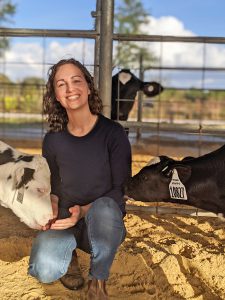 Animal welfare within the food and agriculture industries has become increasingly important to consumers. For animal researchers like Emily Miller-Cushon, Assistant Professor of Animal Behavior in the UF/IFAS Department of Animal Sciences, studying animal welfare has been her life’s work.
Animal welfare within the food and agriculture industries has become increasingly important to consumers. For animal researchers like Emily Miller-Cushon, Assistant Professor of Animal Behavior in the UF/IFAS Department of Animal Sciences, studying animal welfare has been her life’s work.
“Understanding and improving animal welfare is critical for the sustainability of animal agriculture,” said Miller-Cushon. “Animal welfare, which refers to how an animal is feeling, is of growing concern to the public, and the majority consider science-based recommendations to be the best course of action towards improving animal care.”
Dr. Miller-Cushon’s goal is to develop those science-based recommendations through her research. She works to understand how early life experiences affect behavioral development and impact the long-term welfare of animals. The research findings are meant to be applied to working animal operations to improve animal welfare on-farm. Measuring the psychological state of an animal can be complex. Miller-Cushon approaches this task by focusing her research on targeted animal behavior.
Measuring animal behavior is a method of gaining insight into how animals are feeling. By measuring behavior, researchers have a baseline to improve practices for raising and managing livestock. Miller-Cushon’s team studies how young dairy calves develop social behaviors, and how early social contact may have important consequences for long-term ability to cope with stressful events. Most livestock species are social and prefer to feed and rest with other animals. Changes in social behavior can also reveal problems like sickness or pain. Behaviors indicate how an animal is feeling – even though they can’t always tell us.
While public concern does drive efforts to improve animal welfare, there are also positive economic implications for producers. Stress negatively impacts animal growth and production. Improved welfare allows animals to develop more of the skills required to be adaptable. Therefore, these animals are less stressed by changes in the environment. Miller-Cushon hopes to not only improve the life experiences of the animals but by doing so, improve animal productivity.
“Animal welfare is a growing priority in all of animal agriculture,” Said Miller-Cushon. “This ongoing research is aimed at developing recommendations to improve aspects of animal care from birth.”
Miller-Cushon conducts her research with dairy calves raised at the UF Dairy Unit. Her team examines how different management factors, such as changes in early social environments affect measures of behavior. Animal sciences graduate student, Katie Gingerich, has conducted research under Miller-Cushon assessing changes in social behavior as an indicator of pain in calves. Graduate students Emily Lindner and Jess Bonney are beginning a project assessing how early social contact for dairy calves affects long-term behavior and production outcomes. They measure animal behavior using live observation, automated monitoring technologies, and video recordings. These observations help characterize feeding behavior, social interactions between calves, rest and activity, and other behaviors like grooming. By following these animals longer-term, they can see how different aspects of early life management affect calf behavior, response to different life events like movement to a new social group, health, and growth.
For more on Emily Miller-Cushon, Ph.D., visit her faculty profile or follow her on Twitter. Find more information about UF Animal Sciences on our website. Stay in touch with us on Facebook, Twitter, and Instagram.
 0
0
